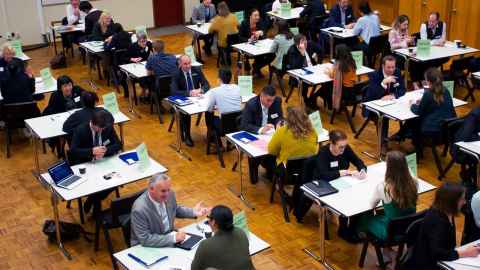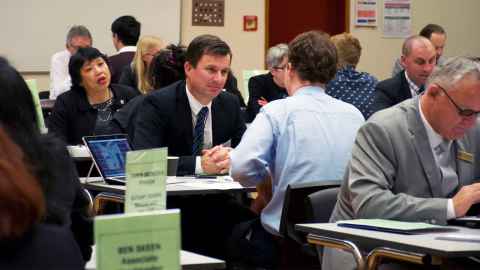‘Speed-dating’ lessons from future secondary teachers and Auckland principals
8 July 2019
One hundred forty students, 70 principals, 800 interviews, a thousand learning opportunities.

This is what’s been achieved during last week’s principals’ interview sessions for students of the Graduate Diploma in Teaching (Secondary), an annual event which connects future secondary students from the University of Auckland with potential employers from the Auckland region - done in "speed-dating" format.
“The aim of the principals’ interview sessions is for our pre-service cohort to have an opportunity to meet with a range of principals who may or may not have jobs available next year,” Dr Ngaire Hoben, Director of Secondary Teacher Education at the Faculty of Education and Social Work, said.
“It gives students the chance to overcome any nervousness they may have about meeting with a principal ahead of an actual interview for a position, and it also provides a chance to find out about a large number of schools which they may know nothing about. The principals who attend get a good feel for who is available and a number do come to the afternoon knowing that they have a specific vacancy.”
It gives students the chance to overcome any nervousness they may have about meeting with a principal ahead of an actual interview for a position, and it also provides a chance to find out about a large number of schools which they may know nothing about.
What did the students say?
For aspiring teacher Estelle Muller (Master of Commerce majoring in Economics), the sessions gave her an insight into the character and leadership of the schools she selected for the interviews.
Estelle hadn’t always planned on becoming a teacher. However, having a son with special learning needs, she had to leave full-time work to help her son through primary school. As she spent more time in the classrooms with her son, she grew to like it. Because she knew she couldn’t teach in primary with her qualification, she decided to study the Graduate Diploma in Teaching (Secondary), which is a one-year programme that can be added to an existing bachelors degree.
Being a mature student with lots of life experience, Estelle wasn’t daunted by any of the interview questions that came her way. Instead she saw each interaction as an opportunity to “strike a relationship with the principals”.
“I read up on each school to try to differentiate between the schools and how they fit into what I want to do in the future. This event is very helpful, each interview prepares me for the next ones. I have found good leads that I’d definitely apply for,” Estelle said.
Randell Buenafe (Bachelor of Arts, majoring in Drama and Psychology) said his approach was to tailor his questions specifically for each school. Like Estelle, he read up on each school to find out more about the school’s culture and values.
“It pays to be informed about the school you’re interviewing for and make a good first impression. Don’t get caught out not knowing something (you should know). Prepare for the interview because it’s a reflection on the future, as a teacher you’ll need to be prepared as well,” Randell advised.
One of the questions Randell found most challenging was “What is your teaching philosophy?”
“As a 22-year-old beginning teacher, I still have to fully figure out who I am and what kind of teacher I want to be.”
The interview sessions were helpful to Randell in a different way because they gave him an opportunity to meet a principal from a school he was initially not interested in. As he got to know more about the school, he realised he’d actually enjoy working in that school. Randell also got a practicum placement through this interview.

The students this year were a lot more prepared and have done more
research about each school, enabling them to ask some unique questions.
What did the principals say?
Jo Williams and Sarah Hayes from Mount Albert Grammar School commented that the students this year were a lot more prepared and have done more research about each school, enabling them to ask some unique questions. To them this was impressive and also reflected the students’ interest in the school.
Ian Davis, Principal of Western Springs College, said the interview sessions have been very helpful to the school and he made sure he came each year to “see the different trends, the best (graduates) and understand areas of strength”.
Like Jo and Sarah, he noted that the students were well prepared for the interviews. However, he suggested they could do a better job learning about the school than looking at the school website.
An insight he shared from the interviews is that “some (students) are made to be teachers and will be wonderful teachers”. However, students who had life experience also had a greater chance at success compared to those who were fresh out of university.
In spite of the casual format the interview sessions were not a walk in the park, but as Ian emphasised, “Teaching is a difficult job, it’s a hard job”.
Comments from other students included:
“It’s really cool to see the reality of people you will be working with.”
“What went well or didn’t go well on practicum - was a challenging question.”
“I want to know the different ways schools approach things, their ethos and what makes them tick.”
“I’m interested in knowing how the school promotes Māori achievement.”